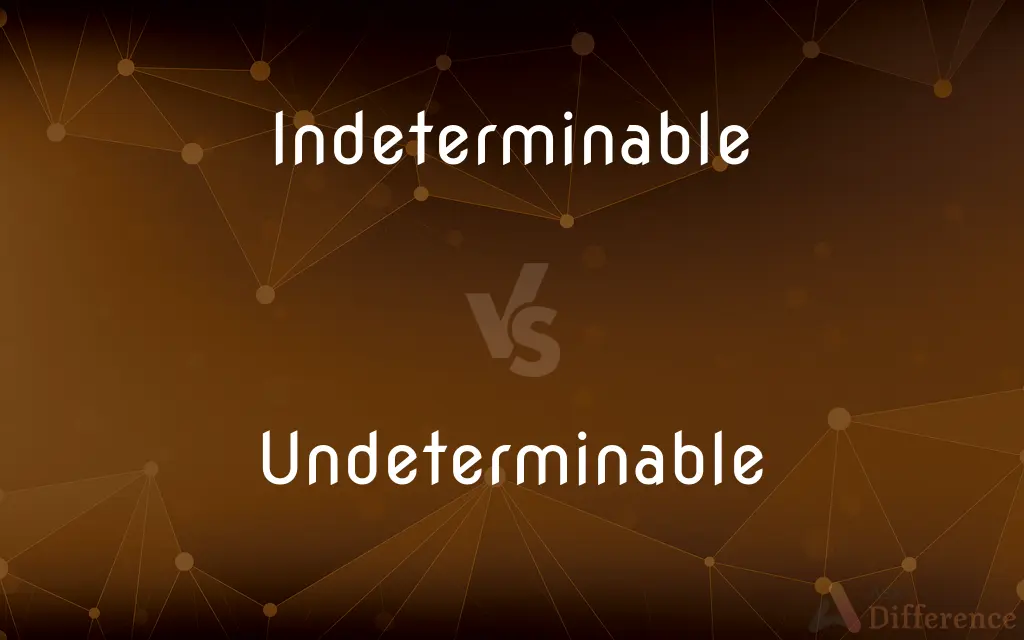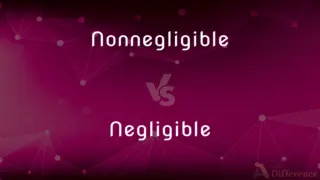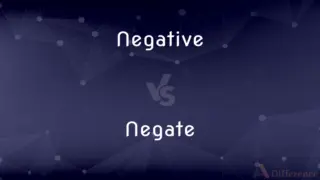Indeterminable vs. Undeterminable — What's the Difference?
Edited by Tayyaba Rehman — By Fiza Rafique — Updated on March 8, 2024
Indeterminable emphasizes the inherent impossibility of making a determination, while undeterminable suggests a current inability to decide or determine, often due to lack of information.

Difference Between Indeterminable and Undeterminable
Table of Contents
ADVERTISEMENT
Key Differences
Indeterminable refers to something that cannot be determined, quantified, or concluded definitively, often due to its inherent nature or complexity. This term implies a permanent state where, regardless of the amount or quality of information available, the outcome or nature of the subject cannot be ascertained. On the other hand, undeterminable is used to describe situations, outcomes, or characteristics that cannot be determined at the present moment, typically because the necessary information, means, or conditions are insufficient or unavailable. While it suggests a temporary state that could change with new information or insights, it currently hinders any conclusive determination.
Indeterminable often applies to concepts, problems, or questions that, due to their very essence, defy finite understanding or resolution. It conveys a sense of ultimate uncertainty that is not likely to be resolved through additional research or technology. In contrast, undeterminable situations are more contextually bound; they hint at the possibility of resolution in the future, assuming the limitations hindering determination are addressed or overcome.
For instance, the exact impact of certain historical events on the present day may be considered indeterminable because the complexity and multitude of influencing factors make it impossible to quantify precisely. Meanwhile, the cause of a specific unsolved scientific phenomenon might be undeterminable with current technology and knowledge, yet it remains conceivable that future advancements could provide the necessary insights for determination.
The distinction also reflects in the approach toward solving or addressing the issues at hand. When something is labeled indeterminable, it often shifts the focus towards managing or acknowledging the uncertainty as an inherent aspect of the situation. Conversely, when something is undeterminable, the effort might focus on improving methods, gathering more data, or enhancing technology to eventually make a determination feasible.
Despite these differences, both terms deal with the limits of knowledge and certainty. They underscore the challenges faced in various fields, including science, philosophy, and daily decision-making, highlighting the complexity of the world and our understanding of it. Whether indeterminable or undeterminable, they represent the frontier of human inquiry, reminding us of the ongoing quest for knowledge and the sometimes insurmountable boundaries of our comprehension.
ADVERTISEMENT
Comparison Chart
Nature of Limitation
Permanent; inherent in the subject's nature or complexity.
Temporary; based on current conditions or lack of information.
Potential for Change
Implies no foreseeable resolution.
Suggests resolution could be possible with new information or technology.
Application
Used for problems or questions that defy understanding.
Used when current means or knowledge are insufficient.
Implication
Uncertainty is an inherent aspect that must be accepted.
Uncertainty could be resolved with advancements or new insights.
Focus
Often leads to managing or acknowledging uncertainty.
Focuses on improving methods or gathering more information.
Compare with Definitions
Indeterminable
Applied to situations where the complexity or nature makes resolution impossible.
The long-term impact of certain ancient civilizations on modern culture remains largely indeterminable.
Undeterminable
Indicates a temporary state that might change with additional information or capabilities.
The whereabouts of the missing artifact remain undeterminable until new evidence surfaces.
Indeterminable
Incapable of being definitively determined or ascertained, often due to inherent complexity.
The exact number of stars in the universe is indeterminable due to its vastness and our observational limitations.
Undeterminable
Viewed as a hurdle that could potentially be overcome in the future.
With current technology, detecting planets around distant stars is undeterminable, but this may change.
Indeterminable
Leads to acceptance or a change in approach, acknowledging inherent limits.
The results of the experiment were indeterminable, leading scientists to reconsider their theoretical framework.
Undeterminable
Encourages efforts towards acquiring more knowledge or developing new methods.
The success of the new treatment was initially undeterminable, but further studies provided the needed evidence.
Indeterminable
Reflects a deep, often philosophical, acknowledgment of uncertainty.
The meaning of life is an indeterminable question that has puzzled humans for millennia.
Undeterminable
Not capable of being determined at the current time, typically due to insufficient data or resources.
The cause of the anomaly was undeterminable with the equipment available in the laboratory.
Indeterminable
Seen as a challenge to the limits of human understanding and technology.
Despite advancements in quantum physics, the behavior of subatomic particles is still largely indeterminable.
Undeterminable
Often involves active search for solutions or additional information.
The exact formula for the ancient pigment is currently undeterminable, but research is ongoing.
Indeterminable
Impossible to fix or measure
Indeterminable traces of poison.
Indeterminable assets.
Undeterminable
Not possible to determine.
Indeterminable
Impossible to settle or decide with finality
Indeterminable questions.
Undeterminable
Not determinable; indeterminable.
Indeterminable
That is incapable of being measured.
Undeterminable
Not capable of being definitely decided or ascertained
Indeterminable
That is incapable of being ascertained.
Indeterminable
An indeterminable thing or quantity.
Indeterminable
Not determinable; impossible to be determined; not to be definitely known, ascertained, defined, or limited.
Indeterminable
An indeterminable thing or quantity.
Indeterminable
Not capable of being definitely decided or ascertained
Indeterminable
Unable to be determined
Common Curiosities
Is indeterminability a concept only in philosophy?
While indeterminability is a significant concept in philosophy, it also applies to other areas, such as quantum physics and cosmology, where certain phenomena or quantities defy precise determination.
Can something that is undeterminable become determinable?
Yes, with advancements in technology, methods, or acquisition of new information, something previously undeterminable can become determinable.
What makes something indeterminable?
Its inherent complexity or abstract nature makes it beyond precise determination.
How does context affect the usage of indeterminable and undeterminable?
Indeterminable is more common in abstract or theoretical contexts, whereas undeterminable is often used in practical, solvable scenarios.
Can the outcome of an experiment be undeterminable?
Yes, until sufficient data or proper methodology is applied.
What is the key difference between indeterminable and undeterminable?
The key difference lies in permanence; indeterminable suggests a permanent state of uncertainty, while undeterminable suggests a temporary inability to determine.
How do researchers deal with undeterminable variables in their studies?
Researchers might use models, simulations, or statistical methods to estimate the effects of undeterminable variables, continuously refining their approaches as new data becomes available.
How does the concept of undeterminable apply in everyday decision-making?
In decision-making, undeterminable factors are those whose influence cannot currently be assessed but might be clarified through further information or analysis, impacting future choices.
Does the indeterminable nature of some questions negate the pursuit of answers?
Not necessarily; the pursuit of understanding indeterminable questions often leads to significant advancements in knowledge and methodology, even if definitive answers remain elusive.
Can something undeterminable become determinable?
Yes, as circumstances or available information changes, it may become determinable.
Can an undeterminable problem become a challenge for scientists?
Yes, it can drive research and innovation to turn it into a determinable one.
Are indeterminable and undeterminable interchangeable?
They can be similar but have nuances; indeterminable suggests a more permanent state, while undeterminable implies potential temporariness.
Can technological advancements change an undeterminable fact to a determinable one?
Yes, advancements can provide the means to determine previously undeterminable facts.
How does the concept of indeterminability relate to philosophy?
It's central to discussions about the limits of knowledge and the nature of reality.
Is the boundary between indeterminable and undeterminable always clear?
No, there can be overlap, and the distinction may depend on perspective and context.
Is the size of the universe indeterminable or undeterminable?
Generally considered indeterminable due to its vast and ever-expanding nature.
Share Your Discovery

Previous Comparison
Nonnegligible vs. Negligible
Next Comparison
Negative vs. NegateAuthor Spotlight
Written by
Fiza RafiqueFiza Rafique is a skilled content writer at AskDifference.com, where she meticulously refines and enhances written pieces. Drawing from her vast editorial expertise, Fiza ensures clarity, accuracy, and precision in every article. Passionate about language, she continually seeks to elevate the quality of content for readers worldwide.
Edited by
Tayyaba RehmanTayyaba Rehman is a distinguished writer, currently serving as a primary contributor to askdifference.com. As a researcher in semantics and etymology, Tayyaba's passion for the complexity of languages and their distinctions has found a perfect home on the platform. Tayyaba delves into the intricacies of language, distinguishing between commonly confused words and phrases, thereby providing clarity for readers worldwide.














































